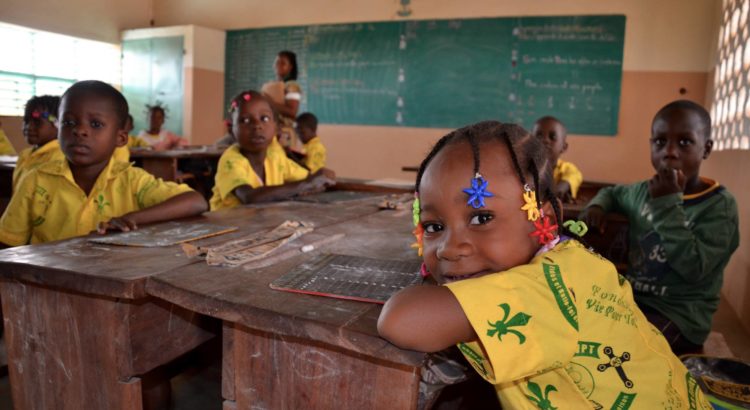Sudáfrica/ Septiembre de 2017/Fuente: Huffpost
Resumen: «Collaboration Schools» es un proyecto piloto del gobierno de Western Cape que comenzó en 2016 con cinco escuelas. Aunque no hay mucha información pública sobre el piloto, las escuelas están basadas en escuelas charter en los Estados Unidos, academias en el Reino Unido, escuelas de concesión en Colombia o Fe y Alegria en Venezuela socialista. Las escuelas de colaboración, al igual que otros modelos, son esencialmente escuelas gubernamentales que son administradas de manera independiente en colaboración con socios privados con el fin de darles la vuelta y mejorar los resultados para los niños pobres. El proyecto apunta a fallar en las escuelas porque no hay razón para convertir la escuela con el mejor desempeño sólo porque es una escuela gubernamental.
«Collaboration Schools» is a pilot project of the Western Cape government which started in 2016 with five schools. Although there is not much public information about the pilot, the schools are modelled on charter schools in the US, academies in the UK, concession schools in Colombia or Fe y Alegria in socialist Venezuela.
Collaboration Schools, like other models, are essentially government schools that are independently managed in collaboration with private partners in order to turn them around and improve outcomes for poor children. The project targets failing schools because there is no reason to convert the best performing school just because it is a government school.
In a country like South Africa with a thoroughly inferior education system in which poor children attend academic sinkholes and dropout factories that are no more than strike zones, a project like this must be a Godsend. Yet listening to our socialist mob, primarily based in Cape Town, you would think the better alternative is to keep writing petitions to the government in order to solve our crisis of inferior education.
Our wise critics, none of whom have children at no-fee government schools, have a stack of arguments against Collaboration Schools. But they all boil down to «democratic control» of schools, which they say is being taken away from communities, parents and teachers to private partners.
This forces us to ask an essential question: why do we send children to school in the first place? Is it because we want to achieve democratic control of schools? Or is it because we want our children to get the best education so they can get better jobs? Listening to our socialist mob, you would think that the only reason we have schools is «democratic control», whatever this means.
Research shows that nearly all school governing bodies in government schools are dysfunctional and there is no true democratic participation by parents who have children at the schools. Where the parents have some involvement, it is ineffective and superficial because most parents are illiterate and unable to contribute meaningfully.
Why is it undemocratic for parents to freely decide to bring in a private partner in order to improve quality outcomes in their school?
As a consequence, «democratic control» means wholesale control of schools by teachers and teacher unions. True democratic governance at schools is undoubtedly important. But we must reject «democratic control» as a subterfuge to frustrate quality-oriented reforms of our education system.
The true motivation for opposition to collaboration schools is an ideological frenzy in which minions styled as activists seek to impose upon the whole nation of 55 million their half-baked theories about what and how education should be. You often hear them yell at us: «education is and must always be a public good in the hands of the state». Such balderdash from babyish politicians.
Quality in education is only a word used in passing when it is convenient. They are generally contemptuous and patronizing towards poor people. They seem convinced that poor parents are incapable of exercising intelligent choices over the education of their children and that the «state» must be there to protect them from greedy people who have no business in education and who only want their money.
But is it undemocratic for a government school to be independently managed? Only if you have contempt for poor people. In the Western Cape pilot, the communities and the parents decide for themselves whether they want their school to be converted into a Collaboration School in order to improve performance for children.
But why is it undemocratic for parents to freely decide to bring in a private partner in order to improve quality outcomes in their school? Or to even wholly outsource the management of their school to a private partner on the basis of a contract in terms of which they have a right to fire the partner in the event of poor outcomes?
Our education needs bold reforms and bold reforms require bold leaders. We have been writing petitions for many years; there are dozens of ground-breaking judgments against the government but our education is still inferior despite all these efforts plus one of the highest per capita expenditures in the world.
Debbie Schafer has the support of all rational and fair-minded people in South Africa who are bothered about quality in our education rather than ideology. She needs to steam ahead, focus on quality in the education of poor children and let our socialist mob worry about ideology because that is their speciality.
Fuente: http://www.huffingtonpost.co.za/mbulelo-nguta/south-africas-education-system-needs-bold-reforms-and-this-requires-bold-leaders_a_23219774/







 Users Today : 156
Users Today : 156 Total Users : 35459751
Total Users : 35459751 Views Today : 278
Views Today : 278 Total views : 3418250
Total views : 3418250